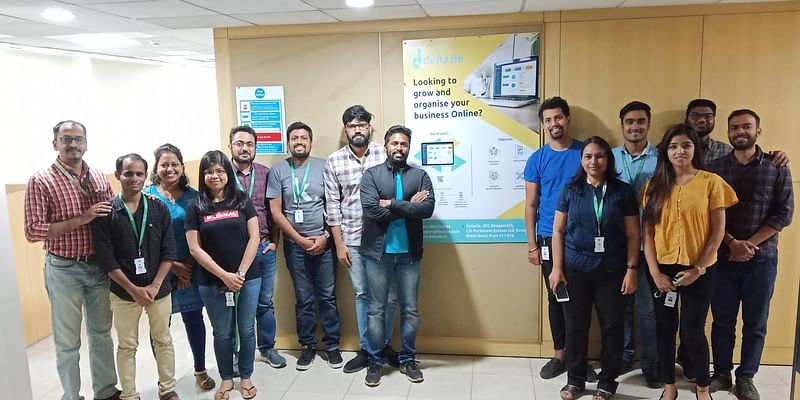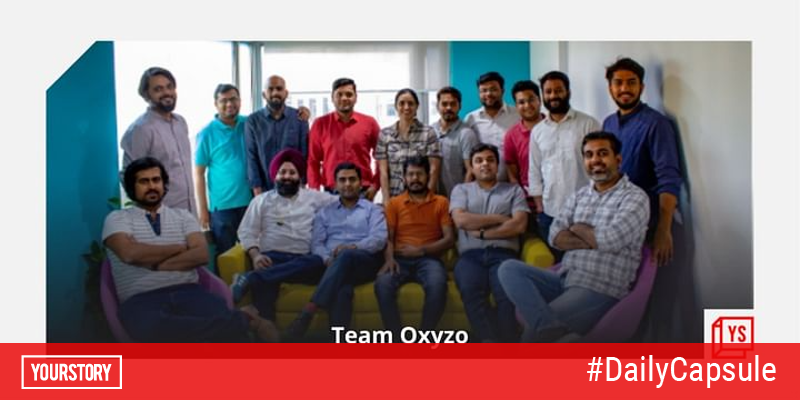This startup by serial entrepreneurs is powering SMEs to keep track of payments online
Pune-based Deazzle is focussed on making day-to-day operations of SMEs easy. It’s recent product Paytrac is an inward payment tracker for small businesses, which relies on QR and PoS to collect payments.
Despite the emergence of organised retail players in India, kirana stores still hold the key with almost 90 percent of the retail grocery market share comprising the unorganised retail segment. According to a report by ASSOCHAM, there were close to 12 million kirana stores in India as of 2019.
Even during the coronavirus crisis, the neighbourhood kiranas have been more dependable and reliable, unlike the large format stores.
In fact, small and medium enterprises (SMEs) have been the largest job creator in India, but they are currently facing multiple challenges that are hindering their growth. And one of them is digitisation. Reports suggest that over 250 to 300 million of SMEs are looking to be digitised by the end of this year, as per the same ASSOCHAM report.
To bring SMEs online, Anand Deshpande, Founder, Chairman, and MD of Persistent Systems, decided to start in 2015.
The Pune-based startup claims to be a one-stop solution for small businesses to grow, manage, and scale by automating key business processes.

The Deazzle team
Anand was soon joined by Chetana Pawar, a Computer Science engineer, with 15 years of experience in the IT sector, and this is her second startup. Anand also roped in Santosh Dawara, who created Pune’s largest volunteer-driven online community for startups - punestartups.org. At present, the team has 12 members. The trio had met through mutual friends and colleagues.
The product - Paytrac
To begin with, the startup built an app for SMEs to manage their day-to-day operations like payments, invoicing, appointments, subscriptions, and part of employee management. The app had customers like milk men, cable operators, salons, or anybody providing services.
But Deazzle was looking to solve the problem of customer acquisition, and needed a field team, which makes scalability a challenge. It found that the customers were using the app to primarily collect and track their payments on a point-of-sale.
“We noticed they would keep changing the QR-codes depending on who was offering the best incentive, and a new QR code was being introduced every month. It was clear to us that our solution would have to work independently of the payment method for us to be relevant. We had to find a simple way and skip expensive integrations,” says Anand, an IIT Kharagpur alumnus.
It was then they got the idea - why not track by reading the SMSes sent by the QRs to the merchants. Within a couple of weeks, they created a proof-of-concept, and Paytrac was launched in October last year.
Paytrac is an inward payment tracker for small businesses who rely on QR and PoS to collect payments.
“We decided to put everything we had behind improving it and taking it to our target audience. We are simultaneously providing a model where we work with payment companies to help them retain their customers through their active participation on Paytrac. We are in the initial stages, and our focus has been to continue to grow our seller base,” says Chetana.
The workings
The startup already claims to have over 65,000 businesses on its platform. Once the user downloads the Android app, it takes permission to read their transactional messages and generate a financial report of their business. This business plus ledger report shows their collection and bank related transactional picture for the last 28 days.
Once a user has seen it, they land on the dashboard screen to view all their daily collection using multiple QR/UPI/POS. They also get to see their bank debit and credit transactions. If the business is dealing with cash, they can log those transactions manually.
“With tracking of all these sources, we have the full picture of their revenue on a week/month/annual basis. We show multiple reports around this data, which works as a decision-making tool for that business. Typically, for a small business, income/expense transactions are scattered all over in multiple apps, notebooks, and accounts. We aggregate all these tracking sources into one so the business owner does not have to look at any other source for the money related matters,” says Santosh.
The startup charges a small commission from the SMEs, but refused to disclose the numbers.
The market and future
The SME segment is one of the largest in India. According to an EVOMA report, it employs close to 106 million people, which is close to 40 percent of India’s workforce. Therefore, it is no surprise that everyone is looking closely at the sector.
Jeff Bezos, Founder and CEO of Amazon, had announced $1 billion funding for Indian SMEs early this year.
Startups like Udaan and Khatabook are also looking at the space closely. Speaking about its differentiator, Anand says, what sets them apart is their ability to provide a single unified view to merchants no matter what payment solutions they are using.
“Over 12 million merchants are using QR codes, and that’s projected to double this year. We’re giving away Paytrac for free and on achieving the necessary scale, it will be of tremendous interest to payments and other financial companies who want to reach merchants,” says Anand.
The team has raised a seed round of funding, and is looking for its next round of funding at present.
“The next round of funding will be used more on the customer acquisition and analysis of the data we have. The data we produce from the app is qualitative, which can help multiple parties to get insights about the micro/small business market,” says Anand.
Edited by Megha Reddy










